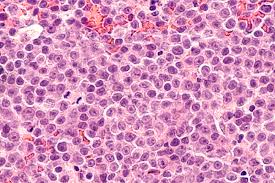Richter Syndrome: Understanding This Rare and Aggressive Transformation
Richter Syndrome (RS) is a rare but serious transformation of chronic lymphocytic leukemia (CLL) or small lymphocytic lymphoma (SLL) into an aggressive form of lymphoma, most commonly diffuse large B-cell lymphoma (DLBCL). It’s a medical emergency that requires immediate attention, as it significantly impacts a patient's prognosis. In this article, we delve into the causes, symptoms, diagnosis, and treatment of Richter Syndrome, along with addressing some frequently asked questions.
ONCOLOGY
Rishwin A R
1/7/20252 min read


Causes of Richter Syndrome
While the exact cause of Richter Syndrome remains elusive, several factors are believed to contribute to its development:
Genetic Mutations: Mutations in genes like TP53 and MYC are commonly associated with RS.
Chronic Inflammation: Prolonged immune system activation may lead to malignant transformation.
Viral Infections: Epstein-Barr Virus (EBV) is implicated in some cases of RS.
Therapeutic Factors: Long-term treatment for CLL/SLL, including chemotherapy and targeted therapies, might trigger RS in certain patients.
Symptoms of Richter Syndrome
Richter Syndrome symptoms can mimic those of aggressive lymphomas, making early detection challenging. Common symptoms include:
Rapid Lymph Node Enlargement: A sudden increase in the size of lymph nodes is often the first sign.
B Symptoms: These include fever, night sweats, and significant unexplained weight loss.
Fatigue: Extreme tiredness that doesn’t improve with rest.
Pain or Discomfort: Particularly in the abdomen due to organ involvement.
Elevated LDH Levels: Laboratory findings often reveal high lactate dehydrogenase levels.
Diagnosis of Richter Syndrome
Timely and accurate diagnosis of RS is crucial for effective management. The diagnostic process typically involves:
Clinical Examination: Detailed assessment of symptoms and physical examination.
Biopsy: A lymph node biopsy is essential to confirm transformation to DLBCL or another aggressive lymphoma.
Imaging Studies: PET-CT scans help identify areas of high metabolic activity indicative of aggressive disease.
Molecular Testing: Genetic analysis to detect mutations associated with RS.
Blood Tests: Complete blood count (CBC), LDH levels, and immunoglobulin analysis provide supportive evidence.
Treatment of Richter Syndrome
Richter Syndrome requires aggressive treatment tailored to the patient’s condition and disease characteristics. Key treatment options include:
1. Chemotherapy
Combination regimens like R-CHOP (Rituximab, Cyclophosphamide, Doxorubicin, Vincristine, and Prednisone) are standard first-line treatments.
2. Targeted Therapy
Novel agents such as BTK inhibitors (e.g., ibrutinib) and anti-CD20 monoclonal antibodies may be used in certain cases.
3. Stem Cell Transplant
Allogeneic Stem Cell Transplant: A potentially curative option for eligible patients.
4. Palliative Care
Symptom management and improving the quality of life are essential components of RS treatment for advanced or refractory cases.
Prognosis and Survival Rates
The prognosis of Richter Syndrome is generally poor, with a median survival of 8-12 months. However, outcomes are improving with advancements in targeted therapies and transplant techniques. Early diagnosis and individualized treatment play a critical role in extending survival.
Frequently Asked Questions
1. Is Richter Syndrome curable?
Richter Syndrome is challenging to cure, but aggressive treatment and stem cell transplants offer hope for long-term remission in select cases.
2. What triggers Richter Syndrome?
While the exact trigger isn’t fully understood, genetic mutations, chronic inflammation, and certain treatments for CLL/SLL are contributing factors.
3. How is Richter Syndrome different from CLL?
RS is an aggressive transformation of CLL/SLL into a fast-growing lymphoma, requiring different treatment approaches.
4. Are there any preventive measures for Richter Syndrome?
Currently, there are no definitive preventive strategies, but regular monitoring of CLL/SLL patients helps in early detection.
5. What is the role of clinical trials in Richter Syndrome?
Clinical trials offer access to innovative therapies and play a crucial role in improving treatment outcomes for RS patients.
Conclusion
Richter Syndrome is a complex and aggressive condition requiring prompt diagnosis and a multidisciplinary treatment approach. While the prognosis remains guarded, advances in research and treatment provide hope for improved outcomes. If you or a loved one is battling CLL/SLL, regular follow-ups and open communication with your healthcare team are essential to catch and address transformations like RS early.
Syndromes.xyz
Explore medical syndromes and their details here.
For Educational purposes only
The information on this site is not in any way, replacement for professional advice. Always consult your physician regarding personal queries
Connect
Support
syndromesxyz@gmail.com
© 2024. All rights reserved.
